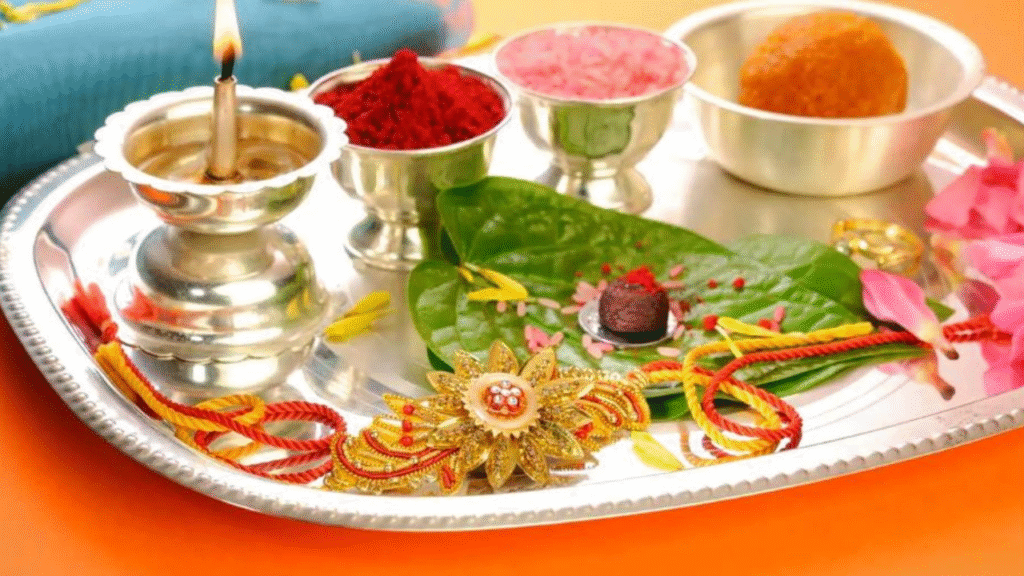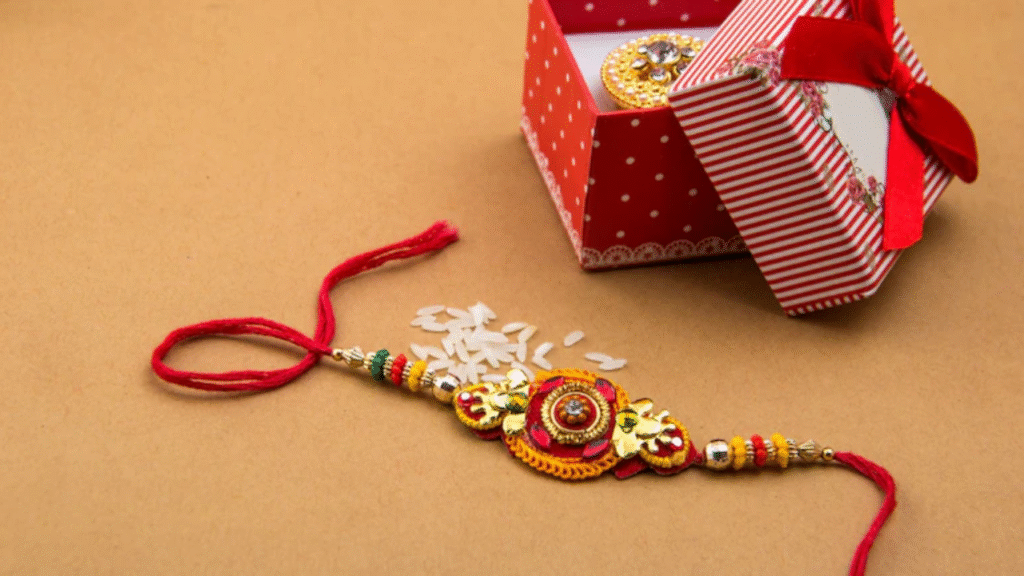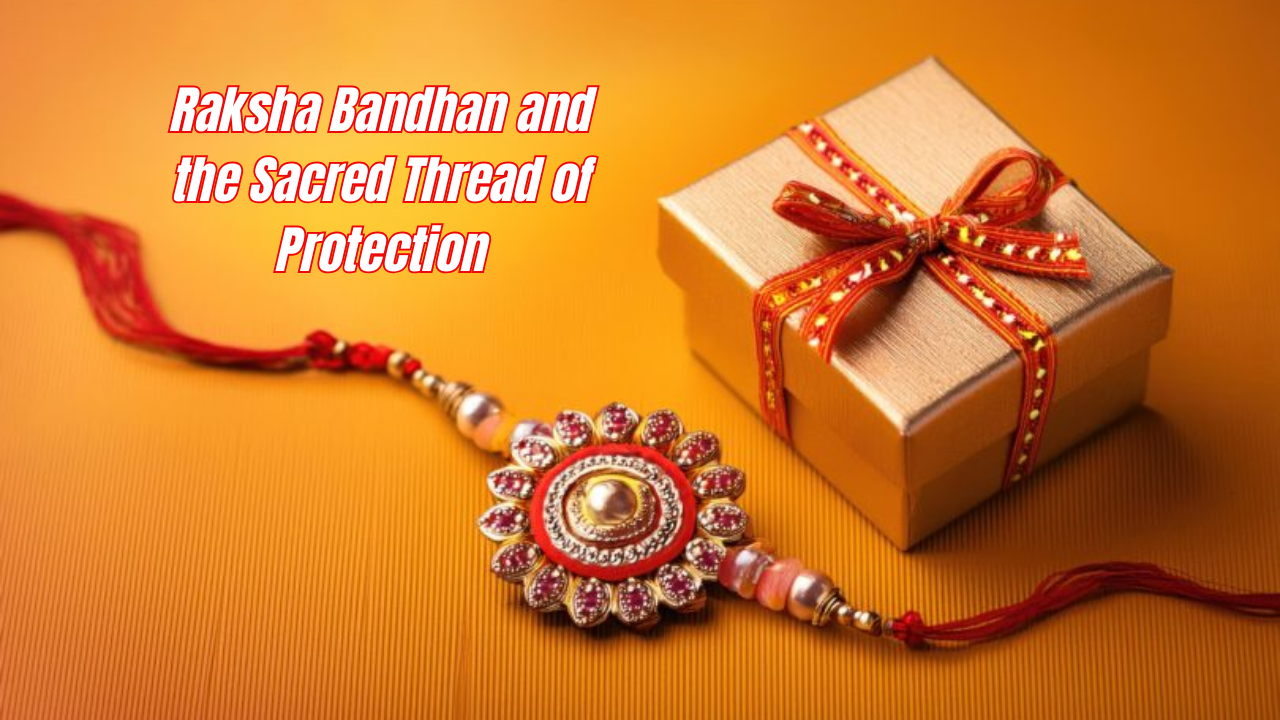Introduction
Raksha Bandhan, or Rakhi, is one of the most beloved festivals in India—a celebration of the enduring bond between brothers and sisters. But beyond the tying of the sacred thread lies a rich tapestry of mythology, tradition, emotional depth, and evolving modern meaning.
Observed on the full moon day of the Hindu month of Shravana (July–August), Raksha Bandhan symbolizes not just sibling love but also protection, duty, respect, and solidarity. This article explores the origins, rituals, regional diversity, deeper significance, changing dynamics, and the festival’s timeless relevance in a contemporary world.
1. Mythological Origins of Raksha Bandhan
Raksha Bandhan is embedded in Indian mythology, with several legends attributing divine meanings to the sacred thread.
a. Krishna and Draupadi
- After Krishna injured his finger during battle, Draupadi tore her saree to bandage it.
- Moved by the gesture, Krishna vowed to protect her at all costs, which he later fulfilled during her disrobing.
b. Yama and Yamuna
- Yamuna tied a rakhi to her brother Yama (the god of death).
- Touched by her love, he granted her immortality and declared that any brother who receives a rakhi will be blessed with longevity.
c. Indra and Sachi
- During a war with demons, Indra’s wife Sachi tied a protective thread around his wrist for success.
- This legend frames rakhi as a defensive talisman, not just a symbol of sibling love.
2. Rituals and Traditions of Raksha Bandhan
Raksha Bandhan is celebrated with rituals that blend devotion, affection, and festivity.
a. Preparations
- Sisters prepare puja thalis with rakhi, diya, roli (kumkum), rice, sweets, and gifts.
- Homes are cleaned, decorated, and filled with joy.
b. The Rakhi Ceremony
- The sister ties the rakhi on the brother’s wrist.
- Applies tilak, does aarti, and prays for his well-being.
- The brother promises to protect her and often gives her a gift.
c. Beyond Biological Bonds
- Rakhi is now tied to cousins, friends, soldiers, and even neighbors as a gesture of universal love and protection.
3. Symbolism of the Sacred Thread
| Component | Symbolic Meaning |
|---|---|
| Rakhi (Thread) | Love, bond, protection, continuity of relationship |
| Tilak (Kumkum) | Blessings, auspiciousness, spiritual protection |
| Diya (Lamp) | Enlightenment, purity, warding off darkness |
| Sweets | Celebration of love and sweetness in the relationship |
| Gift | Token of appreciation, respect, and mutual responsibility |

4. Regional Variations in Celebration
Raksha Bandhan is celebrated across India, but customs vary regionally.
a. North India
- Most widely celebrated in Punjab, Delhi, UP, Bihar, and MP.
- Brothers and sisters travel long distances to be together.
b. West India
- In Rajasthan and Gujarat, women tie rakhis to kings and political leaders as a symbol of loyalty.
- Shravani Upakarma is also performed by Brahmins, where they change their sacred thread.
c. South India
- Known more as Avani Avittam in Tamil Nadu and Kerala, a day for Brahmins to change the janeyu (sacred thread).
d. East India
- In West Bengal and Odisha, the festival is celebrated as Jhulan Purnima, dedicated to Radha-Krishna.
5. Raksha Bandhan in Indian History
a. Rani Karnavati and Humayun
- Rani Karnavati of Chittor sent a rakhi to Mughal emperor Humayun to protect her kingdom.
- Though late, Humayun responded to honor the bond.
b. Rakhi as a Symbol of Unity
- In colonial times, Rabindranath Tagore used Raksha Bandhan to promote Hindu-Muslim unity and resistance to partition.
6. Evolving Meaning in the Modern Era
a. Beyond Gender Norms
- Today, sisters also vow protection for their brothers.
- Many brothers tie rakhis to their sisters in return, emphasizing mutual care.
b. Inclusive Celebration
- Raksha Bandhan now includes:
- Friendship rakhi
- Siblings of all genders
- Rakhi to armed forces, police officers
- Tying rakhis to trees and rivers in eco-conscious initiatives
c. Virtual Celebrations
- In the digital era, families connect via video calls, e-rakhis, and courier gifts.

7. The Economic and Social Impact
a. Rakhi Industry Boom
- A billion-dollar industry including:
- Handmade rakhis
- Designer and gold rakhis
- Personalized gift hampers
- Online delivery platforms
b. Women Entrepreneurs
- Rural and urban women’s self-help groups produce rakhis for income.
- NGOs promote eco-friendly rakhis made from seeds, jute, cotton, and paper.
8. Raksha Bandhan and Indian Armed Forces
a. Rakhi for Soldiers
- Sisters across the country tie rakhis to Indian Army, Navy, and Air Force personnel.
- Children send letters and handmade rakhis to border posts.
b. Rakhi Parv
- Celebrated in schools to instill patriotism and gratitude in young minds.
9. Culinary Traditions: Sweets and Love
Festivals in India are incomplete without food.
a. Common Raksha Bandhan Delights
- Kaju Katli, Rasgulla, Motichoor Ladoo, Coconut Barfi
- Home-cooked meals are shared after the ritual
b. Traditional Rakhi Thali
- Contains sweets, diya, kumkum, incense, and the rakhi
10. Raksha Bandhan and Environmental Consciousness
a. Eco-Friendly Rakhis
- Made from plantable seeds, clay, bamboo, and handmade paper
- Can be grown into saplings post-festival
b. Minimal Waste Practices
- Encouraging digital gifts
- Avoiding plastic and synthetic materials
Conclusion
Raksha Bandhan, at its heart, is a reminder that love, protection, and duty are sacred bonds not confined by gender, biology, or tradition. From its ancient mythological past to its modern, inclusive present, the festival continues to inspire connections—between siblings, communities, and even humans and nature.
As we celebrate Raksha Bandhan, let us remember the true essence: A promise to protect, uplift, and stand by one another in every walk of life.
Table: Key Highlights of Raksha Bandhan
| Aspect | Details |
|---|---|
| Festival Name | Raksha Bandhan (Rakhi) |
| Celebrated In | India, Nepal, Mauritius, diaspora communities worldwide |
| Date | Shravana Purnima (August) |
| Key Ritual | Sister ties rakhi; brother vows protection |
| Signature Symbol | Sacred thread (rakhi) |
| Core Message | Love, protection, mutual responsibility |
| Modern Twist | Inclusive, eco-conscious, gender-neutral |
| Foods | Sweets, festive meals |
5 FAQs About Raksha Bandhan
1. Can Raksha Bandhan be celebrated without a biological sibling?
Yes, Raksha Bandhan celebrates any bond of protection and love. Friends, cousins, neighbors, even teachers and soldiers can be part of the ritual.
2. What’s the ideal time to tie rakhi?
It is best tied during the muhurta (auspicious time) on Shravana Purnima, avoiding Bhadra Kaal.
3. Are there eco-friendly alternatives to plastic rakhis?
Absolutely. Many vendors offer plantable seed rakhis, cloth-based rakhis, and bamboo/coconut fiber threads.
